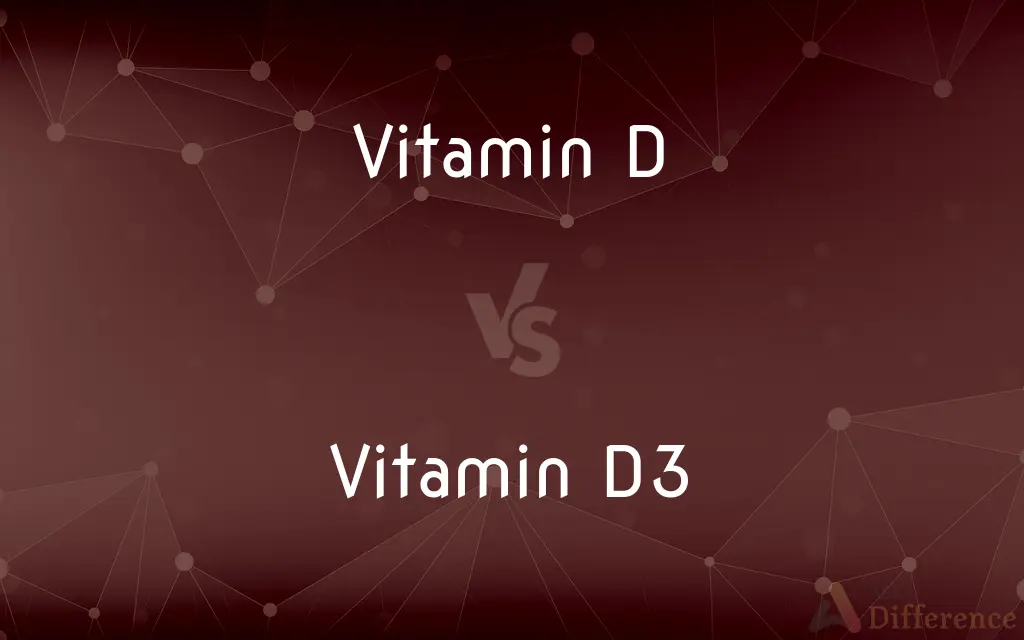Vitamin D vs. Vitamin D3 — What's the Difference?
By Tayyaba Rehman — Published on January 17, 2024
Vitamin D is a group of essential fat-soluble secosteroids vital for bone health, while Vitamin D3, also known as cholecalciferol, is a specific form of Vitamin D synthesized in the skin.

Difference Between Vitamin D and Vitamin D3
Table of Contents
ADVERTISEMENT
Key Differences
Vitamin D is a collective term for a group of fat-soluble secosteroids essential for maintaining bone health, immune function, and calcium absorption. It includes several forms, notably Vitamin D2 (ergocalciferol) and Vitamin D3 (cholecalciferol). Vitamin D3, specifically, is a form synthesized in human skin upon exposure to sunlight and is also obtained from certain animal-based foods.
While Vitamin D represents a family of compounds, Vitamin D3 is one specific member of this family. The body's ability to produce Vitamin D3 through sun exposure makes it unique. In contrast, Vitamin D in a broader sense includes forms that the body can only acquire through diet or supplements, such as Vitamin D2 found in plants.
The role of Vitamin D in the body encompasses supporting bone health, regulating calcium and phosphate, and influencing cell growth. Vitamin D3, being a type of Vitamin D, shares these roles but is often considered more potent and effective in raising and maintaining Vitamin D levels in the blood.
Vitamin D can be measured in the blood to assess a person's vitamin D status, but this measurement includes both Vitamin D2 and D3 levels. When considering supplementation, Vitamin D3 is often preferred due to its potency and longer shelf life compared to Vitamin D2.
Understanding the difference between Vitamin D and Vitamin D3 is crucial in dietary planning and supplement selection. While Vitamin D encompasses several forms essential for health, Vitamin D3 is a specific, highly effective form naturally produced by the body when exposed to sunlight.
ADVERTISEMENT
Comparison Chart
Definition
Group of secosteroids for bone health.
Specific form, also known as cholecalciferol.
Forms
Includes D2 and D3.
A subtype of Vitamin D.
Source
Diet, supplements, sun exposure (D3).
Sun exposure, animal-based foods.
Potency
Varies; D2 is less potent than D3.
More potent in raising blood Vitamin D levels.
Role in Body
Bone health, calcium absorption, immune function.
Shares same roles, but with higher efficacy.
Compare with Definitions
Vitamin D
Group of compounds, including D2 and D3, aiding in phosphate regulation.
Vitamin D supplements can help maintain healthy phosphate levels.
Vitamin D3
A form of Vitamin D known as cholecalciferol.
Vitamin D3 is synthesized in the skin from sunlight.
Vitamin D
Secosteroids essential for bone health and calcium regulation.
Vitamin D is crucial for preventing rickets in children.
Vitamin D3
Potent subtype of Vitamin D, effective in raising blood levels.
Supplements often contain Vitamin D3 due to its potency.
Vitamin D
Vitamins produced in skin from sunlight or obtained from diet.
Spending time in the sun helps your body produce Vitamin D.
Vitamin D3
Derived mainly from animal sources and sun exposure.
Fatty fish are excellent dietary sources of Vitamin D3.
Vitamin D
Essential nutrients for bone growth and remodeling.
Vitamin D is vital for maintaining strong bones.
Vitamin D3
Essential for calcium absorption and bone health.
Vitamin D3 supplements can help prevent osteoporosis.
Vitamin D
Fat-soluble vitamins important for immune function.
Adequate Vitamin D levels can support immune health.
Vitamin D3
Cholecalciferol, effective in immune regulation.
Vitamin D3 plays a role in supporting the immune system.
Common Curiosities
How does Vitamin D3 differ from Vitamin D?
Vitamin D3 is a subtype of Vitamin D, known for its potency in raising blood Vitamin D levels.
What is Vitamin D3?
Vitamin D3, or cholecalciferol, is a specific form of Vitamin D produced in the skin upon sunlight exposure.
Is Vitamin D2 the same as Vitamin D3?
No, they are different forms; D2 is plant-based, while D3 is animal-based and synthesized in the skin.
Are Vitamin D supplements necessary?
Supplements may be necessary for individuals with limited sun exposure or dietary intake.
Can the body produce Vitamin D3?
Yes, the body produces Vitamin D3 when the skin is exposed to sunlight.
Can you get Vitamin D from sunlight?
Yes, exposure to sunlight triggers Vitamin D3 synthesis in the skin.
What happens if you're deficient in Vitamin D?
Deficiency can lead to weakened bones, rickets in children, and osteoporosis in adults.
What is Vitamin D?
Vitamin D is a group of fat-soluble secosteroids important for bone health and calcium regulation.
Are there dietary sources of Vitamin D3?
Yes, Vitamin D3 is found in animal-based foods like fatty fish and egg yolks.
Why is Vitamin D important?
Vitamin D is crucial for bone health, immune function, and regulating calcium and phosphate levels.
How is Vitamin D absorbed in the body?
Vitamin D is fat-soluble and requires dietary fat for optimal absorption.
Is Vitamin D3 more effective than Vitamin D2?
Generally, Vitamin D3 is considered more effective in raising and maintaining Vitamin D levels.
Can you overdose on Vitamin D or D3?
Yes, excessive intake can lead to toxicity and health issues like hypercalcemia.
Does Vitamin D impact mental health?
There's evidence suggesting Vitamin D plays a role in mood regulation and mental health.
Should vegans be concerned about Vitamin D3 intake?
Yes, since D3 is mostly found in animal products, vegans should consider fortified foods or supplements.
Share Your Discovery

Previous Comparison
Articulation vs. Phonology
Next Comparison
Cast Iron vs. Wrought IronAuthor Spotlight
Written by
Tayyaba RehmanTayyaba Rehman is a distinguished writer, currently serving as a primary contributor to askdifference.com. As a researcher in semantics and etymology, Tayyaba's passion for the complexity of languages and their distinctions has found a perfect home on the platform. Tayyaba delves into the intricacies of language, distinguishing between commonly confused words and phrases, thereby providing clarity for readers worldwide.












































